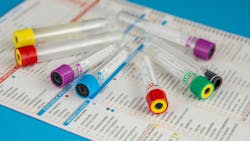Pediatric solid tumors make up approximately 40% of all childhood cancers. While pediatric cancer is rare, children can develop a wide range of tumor types, located in different parts of the body, which can make the differential diagnosis challenging. Investigators at Children’s Hospital Los Angeles have developed a liquid biopsy for solid tumors that has the potential to aid in reaching a specific diagnosis when surgery or a tissue biopsy is not feasible.
The study findings were published on February 23 in the journal npj Precision Oncology.
For their research study, the CHLA team combined a technique known as Low-Pass Whole Genome Sequencing (LP-WGS) with targeted sequencing of cell-free DNA from plasma to detect copy number changes, as well as mutations and gene fusions, that are characteristic of pediatric solid tumors. An important feature of the study was that it required a much smaller volume of sample than is required for liquid biopsy studies in adults. Since an infant or young child has a smaller blood volume, the assays needed to be scaled down to accommodate this difference.
The first version of the test, launched in November 2022, evaluates chromosomal copy number changes in blood samples, cerebrospinal fluid and the aqueous humor of the eye to aid in the clinical diagnosis for patients with solid tumors, brain tumors and retinoblastoma, respectively.
The next version of the clinical assay, available in about six months, will include detection of mutations and gene fusions.
The liquid biopsy-based genetic tests join the CHLA-developed OncoKids cancer panel, a next-generation sequencing-based assay designed to detect changes in DNA or RNA that are associated with pediatric leukemias, brain and solid tumors; the CHLA Cancer Predisposition Panel; RNAseq for cancer, a transcriptome-based assay using RNA sequencing; VMD4Kids, a panel for vascular and mosaic disorders; as well as methylation array-based profiling for pediatric brain tumors.

